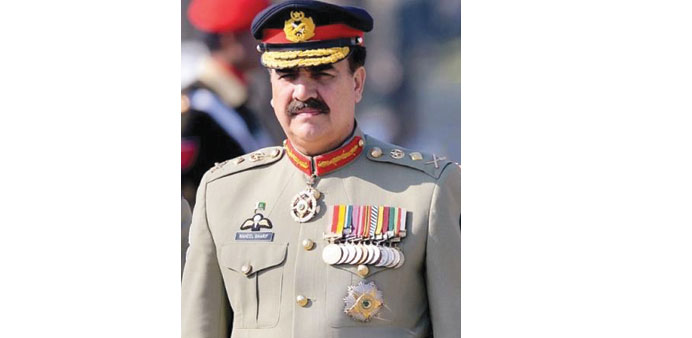AFP/Islamabad
Pakistan’s army chief General Raheel Sharif has approved an increase in the number of military courts to handle pending terrorism cases in the southern city of Karachi, the military said.
Lawmakers voted in January to set up military courts to hear terrorism cases, prompting criticism from lawyers and rights activists concerned about the hearings, which are held in secret.
“Chief of Army Staff approved increase in number of military courts at Karachi to handle outstanding terrorist cases,” army spokesman Major General Asim Bajwa said on Twitter.
General Sharif “directed across the board operations to eliminate terrorists, criminals and mafias from Karachi,” Bajwa said.
Sharif was in Karachi to review an ongoing operation by paramilitary Rangers and police against militant and criminal groups.
It was not immediately clear that how many military courts were already holding trials or how many cases were pending before them as these courts work in restricted places.
Karachi, a port city of some 20 million and Pakistan’s economic hub, is frequently hit by Islamist, political and ethnic violence.
Paramilitary forces began a sweeping crackdown on alleged militants in the city in 2013 that has led to substantial drop in overall levels of violence.
But rights groups have accused police and paramilitary troops of carrying out extrajudicial killings in staged gunfights.
The military courts were established as part of a crackdown on militancy following a massacre at a school in the northwest city of Peshawar on December 16 last year.
Parliament has approved the use of the courts for the coming two years, and cases are referred to them by provincial governments.
The Supreme Court backed the move earlier this month, rejecting claims it was unconstitutional, but said defendants had the right to challenge sentences in civilian courts.
But some have called for the trials to be more transparent.
The International Commission of Jurists has condemned the military courts as “secret, opaque” and in violation of fair trial obligations.
The army announced the first verdicts and sentences from the new courts in April. Six militants were condemned to death and another jailed for life, all on terrorism charges, though scant details of the offences and trials were given.
On August 13, it announced death sentences for seven more militants for their involvement in the Peshawar school massacre and an attack on a bus of the minority Shia Ismaili community.

Raheel Sharif
